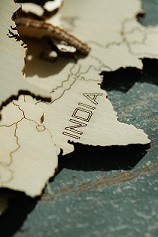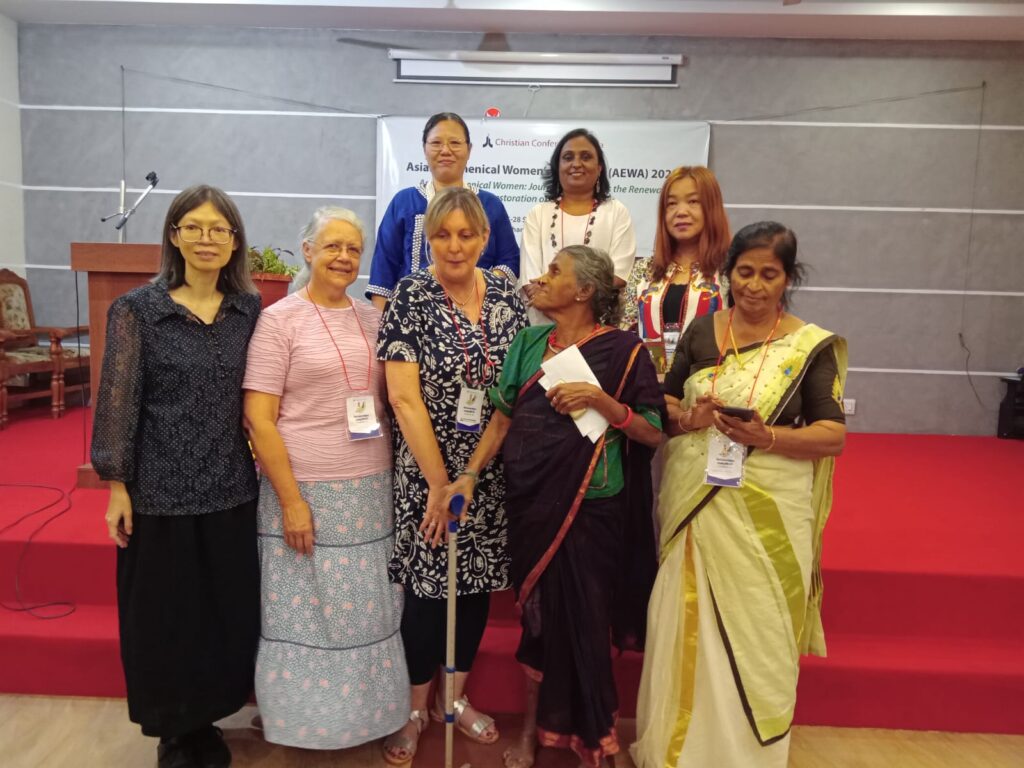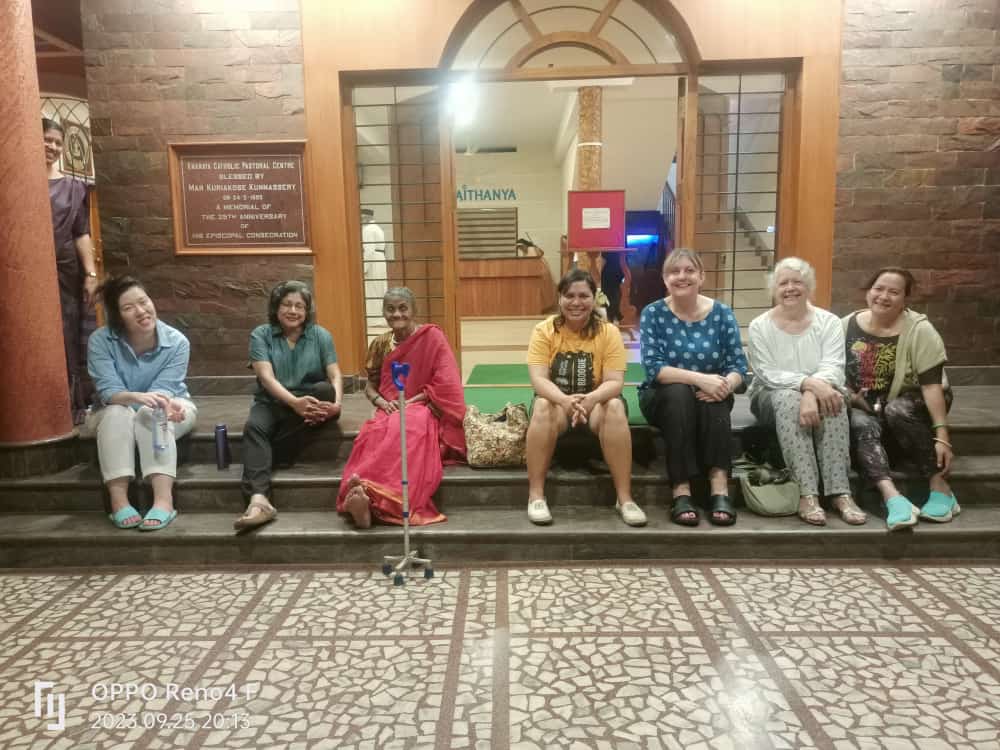Back in September, I visited Kerala, India, to represent the Methodist church at the Christian Conference of Asia General Assembly. During that gathering I had the opportunity to meet Daya Bai, (born Mercy Mathew), a renowned community organiser and social justice activist who has spent her adult life working alongside people from some of the most marginalized tribes of Northern India.

Daya is something of a local celebrity in Kerala (She’s the one in the green and black Sari standing next to me) , and so to have the chance to have a one to one with her, even just to hear her story first hand, was an honour.

I began by asking Daya to tell me how it all began- where did her passion from social justice come from? Daya shared how she grew up in a relatively affluent family, In Kerala, with access to a good education and very much involved in her local Catholic Church. Her father and mother, who were both followers of Gandhi, used to open up the family compound and invite people living in poverty to come and share meals. They created a shared space where everyone was valued and treated with dignity. This had a deep impact on Daya, and so from a very young age, she sensed a call to spend her life with and alongside those who had been marginalized.
I shared a little of my story in return, and we realized that for both of us, our passion for justice and peace seeking was borne out of experiences in our childhood and teens. Daya has an astute and nuanced understanding of the history of conflict and division in Ireland, and is in touch with a number of Keralites who are currently living in Ireland –so there was another unexpected point of connection!
At the age of 17, Daya left home to go and spend time with a group of nuns. Many people expected that she would follow a calling to join a Religious Order, and live out her vocation in this way. But Daya quickly grew frustrated- she felt the nuns were not radical enough. She describes weeping, and asking God ‘what is it that you want me to do, if not this?’ It was suggested she trying training as a teacher, then as a social worker- but again, neither felt to Daya as though they were what she was being called to do. So, in her early twenties, she moved on. Daya told me ‘it took time to find my place, but the Spirit sent me, so I had confidence.’
Influenced by her reading of liberation theologies, Daya made the decision to go and work amongst communities who were experiencing marginalisation and injustice. She spent time working in the biggest refugee camp in Northern India, with refugees from Pakistan.
It was in her subsequent work with tribes people in Northern India that she became known as Daya Bai; ‘My given name, Mercy, was a foreign name for them. So they renamed me ‘Daya’ – the word for Mercy in their language, and ‘Bai’ which is the name given to any woman who is a member of that tribe.’ Daya still wears the distinctive style of sari and jewellery of the tribes of that region. She herself has experienced prejudice and discrimination as a result of this. In recent years, a local bus driver in Kerala forcibly made her leave his bus, believing her to be a beggar; until others, outraged, intervened, saying ‘Don’t you know who this is? This is Daya Bai, daughter of Kerala!’
Daya has now moved back to her home state of Kerala, believing that the tribes she worked with are now confident in organising practices and are flourishing. Yet Daya still continues to work alongside others for justice- for the past few years, her focus has been on petitioning the local government to provide the medical help needed for the hundreds of villagers impacted by the legacy of 20 years of spraying toxic pesticide on cashew plantations, 2 or 3 times a year. These pesticides have caused terrible illness and birth defects in local communities. Daya has been persistent in organising through local schools and colleges to raise awareness, and gain support and solidarity, and she has twice been on hunger strike to compel local government to deliver the support they had promised. When she fasted, she prayed to God for courage. People from the villages joined her as they could, to sit with her and bring her shelter from the rain.

Our one to one moved on to deeper conversation about how and where our Christian faith had shaped not just what, but how, we sought after justice.
The way in which Daya sought to live, with and alongside people at the margins, and to seek justice through organising practices, has, at times, been met with resistance from the established churches. For Daya, this has meant that for her, it has not been possible to hold together her Christian faith with belonging to an established Christian church. This has allowed her freedom. As she describes it; ‘I don’t have to ask permission- I hear God’s call – I do.’ But this has also been a source of deep frustration. Why, Daya, asks, has the church not been there, alongside communities, in the way she has been? I was able to share some of my own frustration at encountering resistance to organising practices- which Daya think may be because some are actually resisting the invitation to set aside power and truly come alongside people. For Daya, at the heart of all that we are called to do as Christians is to seek to build relationship and connection with those who have been marginalized; just as Jesus did. Consider the Woman at the Well, she said; what if Jesus wasn’t thirsty, but was actually seeking a way to connect?
Towards the end of our one to one conversation, I asked Daya what she would want to say to the Church – in both her, and my context.
To individual Christians, and to churches, Daya says; ‘It’s not too late to dream – shake off the ‘being a minister’ persona and come down, feel, with the people.’ Daya is very clear that for her, to be a Christian, to be a follower of Jesus, means going down to be with and alongside the lowest. To be prepared to become completely immersed in that community and culture; even thought this is always difficult and painful to experience. This really hit home for me- in my current, Connexional roles, the opportunities to do that are fairly limited, yet it is through this kind of deeply relational work in community that I discerned God’s call to ordained diaconal ministry in the Methodist Church. I currently volunteer as part of the leadership team for Street Banquet (the Birmingham District’s NPNP). But might God be calling me to do something more- to go back to the practices and ways of being that my call was borne out of?
A phrase Daya repeated often, and which has stayed with me as a reminder, a call back to, the why of faith rooted organising, is this:
‘There are not enough words to narrate God’s love. There is not enough life to say thank you to God.’
Daya’s deep love for Jesus is evident in all she says and in her whole life story. Her life of radical commitment to organising for justice and transformation is absolutely rooted in her faith, all because, to use her words;
‘I had a love affair- not with a man, or a woman, but with Jesus. With that man, who says to us as Christians, follow me.’
Let’s follow.
Kerry Scarlett

Leave a Reply